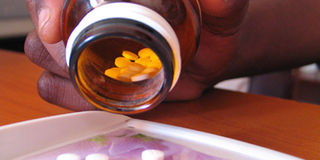Beware of herbal remedies, warn experts

Anti-biotics, pain killers and anti-malaria drugs are the most counterfeited because of high demand. A recent survey by the Malaria Control division and the Pharmacy and Poisons Board established that 16 per cent failure rate emanated from sub-standard products.
Kenyans might unknowingly be pumping poison into their bodies by using the much-hyped herbal-based products.
Most of the products, presented as food supplements and medicines, might be unsafe, after all, since their safety standards have not been established.
National Quality Control Laboratory director Hezekiah Chepkwony termed preliminary results of an ongoing survey on their safety as “disturbing”.
Dr Chepkwony, who addressed stakeholders in the pharmaceutical industry on the prevalence of counterfeit medicine in the country in Nyeri county Thursday cited a herbal contraceptive from East Asia that was found to contain 40 times the strength of conventional contraceptives.
Children born by parents using the contraceptive had reported peculiar features, for instance, male children developing breasts.
Besides herbal-based medicines, wellness products that are common in many outlets were also found to be harmful.
The craze to use such products is at its highest in the country following the hyped marketing strategies adopted by the dealers.
The agency behind the survey is a WHO-accredited quality control arm of the Pharmacy and Poisons Board that ensures the quality and safety of medicines and other products in Kenya .
On Thursday, Dr Chepkwony pointed out that ensuring quality was a complicated process.
“The safety component of such products has not been established as there are challenges when it comes to their analysis. The method of such analysis is the problem, but information coming from a study on the products is very disturbing,” he said.
Pharmacy and Poisons Board official Edward Abwao said dealers had resisted attempts to test their products, arguing, it was outside the scope of the board.
Most seek registration with the Ministry of Culture, which does not require that some herbal products be tested.
Dr Abwao, however, assured Kenyans that the loopholes were being sealed now that the government was developing guidelines for the registration of such products.
Dr Chepkwony said the biggest challenge was not the presence of counterfeits but sub-standard products.




